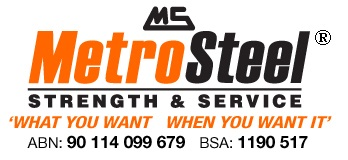 One of the questions we often get asked from customers is what is the difference between ferrous and non-ferrous metals. The answer is really quite simple in that ferrous metal contains iron and non-ferrous metal doesn’t, although ferrous metals may have small amounts of other metals added to give it the required properties. As a result both types of metals have different uses, which you need to be aware of when planning your next project.
One of the questions we often get asked from customers is what is the difference between ferrous and non-ferrous metals. The answer is really quite simple in that ferrous metal contains iron and non-ferrous metal doesn’t, although ferrous metals may have small amounts of other metals added to give it the required properties. As a result both types of metals have different uses, which you need to be aware of when planning your next project.
Ferrous metals
Ferrous metals such as carbon steel, cast iron, and stainless steel are all known for their strength because they contain iron. As a result they’re widely used in industrial and architectural fabrication such as vehicles, railroads, bridges, and skyscrapers. Because of their magnetic properties they can also be used in engines and appliances. The fridge magnet that you use to hold your shopping list on your fridge door will be made from a ferrous metal, for instance. Because of their high carbon content, ferrous metals are more prone to rust. There are exceptions to the rule, however, and these include stainless steel and wrought iron. The former has sufficient chromium in its make-up which helps prevent corrosion while the latter has a high level of pure iron which means it rusts more slowly.
Examples of ferrous metals include:
-
Steel which is made up of iron and carbon and is predominantly used in industrial metal fabrication and construction
-
Carbon steel which is an exceptionally hard metal that has a higher carbon content than steel
-
Stainless steel which is an alloy steel made with the addition of chromium that protects it from rusting
-
Other alloy steels include lightweight metals such as nickel, titanium, and chromium which are used to give strength to other metals without adding too much weight
-
Cast iron made from iron, carbon, and silicon which is a heavy, hard metal that’s resistant to wear.
Non-Ferrous metals
Non ferrous metals are as a rule more corrosion resistant than ferrous metals because they don’t contain iron. Some of the most common examples include copper, aluminium, and aluminium alloys which are used for industrial purposes such as in roofing, gutters, pipes, and electrical. Other non ferrous metals include zinc, tin, lead, brass, gold and silver. Non magnetic, other properties include lightweight and malleable. This makes them the ideal choice for use in aircrafts.
Examples of popular non ferrous metals include:
-
Copper – This is very malleable with high electrical conductivity
-
Tin – This metal is soft and malleable with a low tensile strength and is often used to coat
steel to help prevent corrosion
-
Lead – This is a heavy, soft metal that is malleable with low strength and a low melting point
-
Aluminium – This is low strength, lightweight, and easily shaped
-
Zinc – This has a low melting point, medium strength, and is often used in galvanising which prevents rust from forming on iron or steel
If you’re not sure which metal is best suited to your project then ask the experts at Metro Steel. We’ll be pleased to assist. Give us a call on 07 3204 1000 if you’ve got a project in mind and would like a no obligation quote. We look forward to hearing from you.
 Talk to an Expert (07) 3204 1000
Talk to an Expert (07) 3204 1000 Working Hours - Mon – Fri 7:00 AM – 4:00 PM
Working Hours - Mon – Fri 7:00 AM – 4:00 PM